Photos by Michael James Murray
Lil Uzi Vert is bouncing around this hotel room, trying to balance on his toes on the edge of the box spring that sticks out from under the mattress as he talks, radiating the type of youthful energy that turns everything into a game, making me feel old. He’s physically small, too, just a little over five feet tall, with green-tipped baby dreads and a tiny round tattoo just under his left eye that, together, make him look a bit like a diminutive Wiz Khalifa. Wiz also happens to be one of the 21-year-old rapper’s influences and a mentor of sorts, which, given that Wiz himself has had a music career for less than a decade, is probably another reason to feel old. But not quite. The enthusiasm is contagious.
Videos by VICE
“I’m finna be a fucking superstar, though,” he’s explaining. “I’ma make, like, millions. A lot of crazy shit. Just flex up. You know. Have fun.” Five times in, like, the next five minutes, he adds, “I’m just in the moment, bro.” His eyes light up animatedly when he gets excited, which is often, particularly tonight: He’s visiting New York from his hometown of Philadelphia, and in two hours he’ll be taking the stage at Yams Day, a celebration of the late A$AP crew mastermind. Although the two never met in person before his death, Yams was one of the first high-profile tastemakers who helped Uzi find the broad online audience he has today. But the show is also a big deal because just a few years ago Uzi, despite being the guy who had put all his friends onto A$AP Rocky’s music, was grounded and couldn’t even go to Rocky’s Philly concert. This time, he’s helping his friends get in, and as we talk he’s fielding their calls and texts about meeting up.
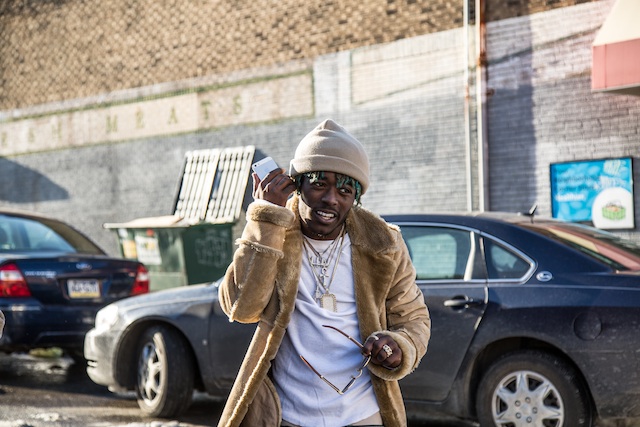
“A$AP is the shit, man,” Uzi tells me. “For real. Definitely paved the way for a lot of us young artists, just with fashion and everything. Even though Kanye and Pharrell been doing fashion, it was just more relatable to us ’cause they were younger, and it was more they still was outside in the street.” Uzi drew on A$AP Ferg’s explosive cadences as a rapper, too. Another influence was Big Sean: “That shit really taught me how to flow, dead ass.”
That statement might give a lot of older fans pause; he’s candid about relating more to these newer rappers than guys like Jay Z, even if Jay is “gonna forever be the shit.” But as he talks through his influences, it becomes clearer that this worldview is precisely his appeal: Lil Uzi Vert is an old head’s worst nightmare. He is the incarnation of hip-hop’s new youth mainstream, the center of the trap rap Snapchat generation gap.
Traditionalists have every right to be terrified; kids who barely remember a time before the sounds of artists like Young Thug and Chief Keef were ascendent have every right to be excited. Lil Uzi Vert is, for better or for worse, yanking people into the future, a world in which rap is a swirling kaleidoscope of post-regional styles and post-genre sounds, in which music lives for free on Soundcloud and is experienced as much through videos on a cell phone as anywhere else. It’s no coincidence that, during Uzi’s New York headlining concert debut the next night, he will spend much of the time onstage rapping directly for fans’ selfies.
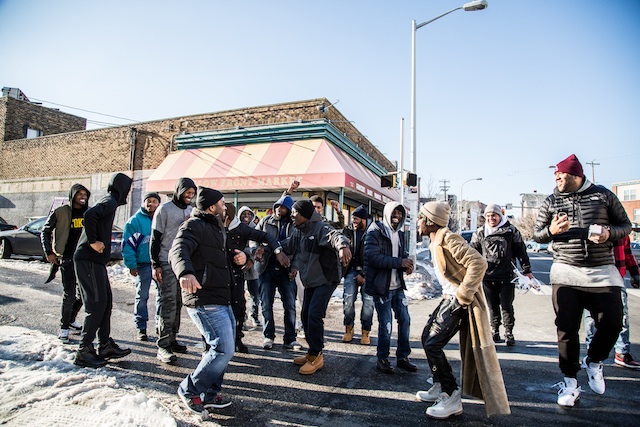
Uzi’s already seen at least one such cultural shift first hand: “Skaters, skinnies, Etnies, Ice Creams, Hot Topic, Spencers, you know, all that type shit, all that dark shit,” he says, rattling off some of the trends he saw emerge while he was in high school as rap culture took a more alternative turn. “That changed the way that I thought about life, like, period. Like, not even just music, like, that shit really showed me there’s really no rules to nothing. Like, ain’t no rules or nothing, nobody can tell you nothing.” His eyes get particularly wide as he says this.
Symere Woods grew up in North Philadelphia, splitting time between separated parents, doing “regular stuff.” He got into skating and alternative rock like Paramore and Marilyn Manson—he frequently cites the latter as a major influence—which made him stand out from his siblings and most of the other kids he knew, especially in the rougher Francisville neighborhood where his dad lived.
“My whole neighborhood and all that, I’m the only one that look like this,” he says, gesturing at his hair and outfit: a leather jacket, asymmetrical hoodie, and track pants. He added, “They would be like, ‘Yo you on some, on some skateboarding shit…’ It’s the hood.” At school, “they didn’t fuck with me. They thought I was annoying.” His first real interest in rap, as he often explains in interviews, was stoked by getting Mike Jones and Ying Yang Twins CDs from his grandma, whom he considers his best friend. “My grandmom’s lit, bro. Like low key,” he quips, explaining that she combs his Instagram and asks about the pictures of him kissing girls and smoking.
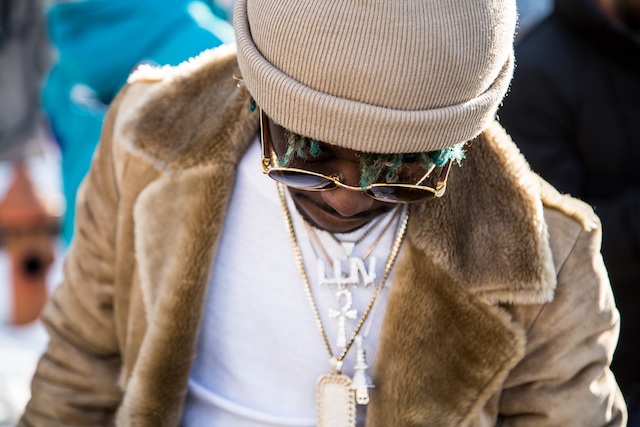
In 10th grade, one of Uzi’s high school friends, William Aston, recorded a freestyle over Chris Brown’s “Look At Me Now” that took off around the school. Uzi was jealous of the attention it got and decided to take action. “I’m like, if he made a song, I can make a song,” he says. He kept recording freestyles over beats he’d find on YouTube, and he and Aston dubbed themselves the Steak Town Zombies, a loose affiliation and name that still continues. They caught the attention of local DJ Buzz Worthy, who offered to manage them. Aston declined, but Uzi, embracing the moment, impulsively agreed.
“I was like ‘Fuck it, what do I got to lose?’” he remembers. Through Buzz Worthy, Uzi connected with producer Charlie Heat, who produced his 2014 breakout hit, “U.Z.I.” (more recently Heat has been working with Kanye West). That song, in turn, made it onto the local radio, via DJ Diamond Kuts, where it caught the ear of Atlanta DJ Don Cannon as he was driving through town. At the time, Uzi was facing pressure from his mom, a nurse, to be more realistic about his ambitions and get a real job. He hadn’t taken too enthusiastically to a position as a stock boy at Bottom Dollar and soon quit. Unable to deter him from rapping, his mom kicked him out, so he moved in with his grandma, relying on the wi-fi he could steal from her neighbors.
“My mom and them, I don’t want to say they were against it, but they wasn’t with the shit, like it wasn’t with that at all,” Uzi says. “My grandma was with the shits all the time, and my grandma [was] like, ‘Go ahead bro, like yeah I know you gonna make it, like yeah, just do it.’” Cannon and his longtime collaborator DJ Drama soon brought Uzi under their wing to record in Atlanta, and the ensuing two years have seen Uzi’s steady but rapid rise. By last summer, he was no longer looking up “Wiz Khalifa type beats” on YouTube and shopping for studded belts at Hot Topic; he was on tour with Wiz Khalifa and Fall Out Boy.
Uzi’s music has proven popular in ways that transcend simple co-signs, though. The songs on his Soundcloud—the easiest place to find his music—each have anywhere from hundreds of thousands to millions of plays, and those counts are climbing vertiginously: His most played solo track, “Money Longer,” is also his most recent. His sound, particularly on last fall’s standout project, LUV Is RAGE (or, if you just want the hits, his “Essential Pack 2” Soundcloud playlist) is confusing, in that it feels instantly grounded in the world of contemporary rap but just a bit too off-kilter to be on the radio. Uzi has fully absorbed the genre’s shift toward trap beats, blown-out sound, and sing-song melodicism, and the cumulative effect is a little like hearing a Rich Homie Quan song from outside the club. If Chief Keef blazed the trail for rap songs as mush-mouthed sing-alongs, Uzi is the proper arrival, pushing that sound into more colorful, gleeful territory with the help of a murderers’ row of current producers that includes FKi, Sonny Digital, and TM88, as well as one of the architects of Keef’s own evolution, DP Beats.
Songs like “7am,” which could pass for a more blunted sequel to Soulja Boy’s “Zan With That Lean,” and “Top,” which has the inescapable hook of “who the fuck are youuuuu,” feel like fun house riffs on trap staples, held together above all by Uzi’s deceptively versatile voice. He may sound like he’s fumbling through a melody only to backflip into a twisting run of Auto-Tune or staccato bars. On his biggest hit, the DJ Carnage song “WDYW,” which also features A$AP Ferg and Rich the Kid, it’s Uzi’s plaintive sing-song hook that makes the song work.
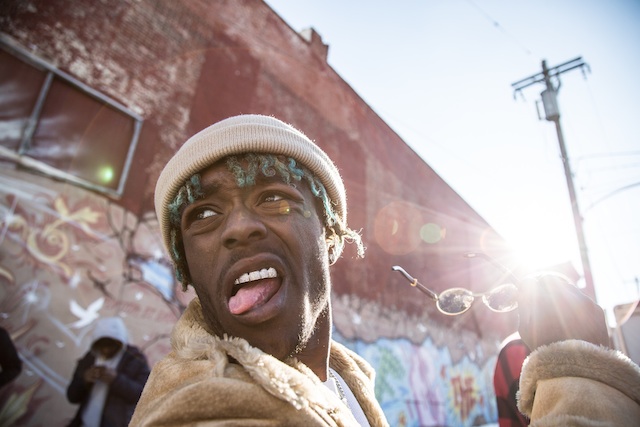
“If [a song is] that great, it mean that it’s inspiring,” Uzi muses. “If it’s inspiring, then it’s inspiring the people to make music. Maybe it’s something you said in there that made it that great… honestly, even though I’m in the moment, I’m not selfish. OK? Like it’s, like, selfless. You feel me? So I really care. That’s why I do all the shit I do. Make sure people are paying attention.”
Live, Uzi is a natural entertainer, someone who’s not only comfortable in the spotlight but who actually thrives in it. At his show the next night, headlining Manhattan’s Santos Party Haus in a flannel shirt and with his hair redone in cornrows, Uzi truts and windmills around the stage dancing, punctuating lines with dabs, exaggerated winks, and other hammy facial expressions. He’s sweetly coy and, frankly, pretty adorable. He would win over your mom. Uzi barely raps—and when he does, it’s not always into the microphone—but the crowd supplies all the words anyway. His role is more of a conductor for the party, jumping into the crowd, bringing out collaborators like A$AP Ferg and fellow baby-dreaded social media sensation Playboi Carti, and FaceTiming directly with showgoers’ friends. It is precisely the kind of rap show that anyone concerned about the musical craft of live performances would abhor, but it’s still somehow wildly entertaining.
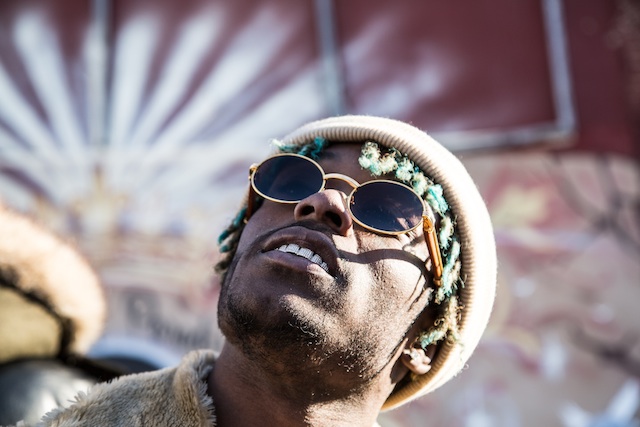
“I’m legit a rock star,” Uzi tells me the night before. Many artists make that claim, but Uzi’s version is particularly charismatic, less wrapped up in the idea of hotel room-destroying energy than a type of intense enthusiasm for merrily leading other kids down the path of having more fun. His simple, social media-friendly approach toward doing that has been full of successes, including a recent joint deal with Atlantic Records that allows him to stay semi-independent and continue the formula without much tampering. He seems mildly stunned to have landed a serious girlfriend—whom he connected with, naturally, over social media; her likeness appears on the cover of LUV Is RAGE.
“For a while… it was probably only like 50 listens or 150 listens [on Soundcloud],” he says, reflecting of his earliest days building one fan at a time. “I looked at it like, ‘150 people listened to my song, oh shit!’”
At one point in the hotel room, he muses that rapping is probably the longest commitment he’s ever made. Maybe that sounds silly coming from a 21-year-old whose music career started in high school, but Uzi’s relentless focus on living in the moment makes it feel like hard-won good fortune and genuine serendipity. Perched on the bedframe, he looks me in the eyes with excited amazement: “Why the fuck am I here? Like I could be anywhere, and I’m here. So. Man.”
Michael James Murray is a photographer based in Philadelphia. Follow him on Instagram.
Kyle Kramer is an editor at Noisey. Follow him on Twitter.
More
From VICE
-

Photo by Neil Lupin/Redferns -

(Photo by Matthias Nareyek/Getty Images) -

-

(Photo by Michael Ochs Archives/Getty Images)
